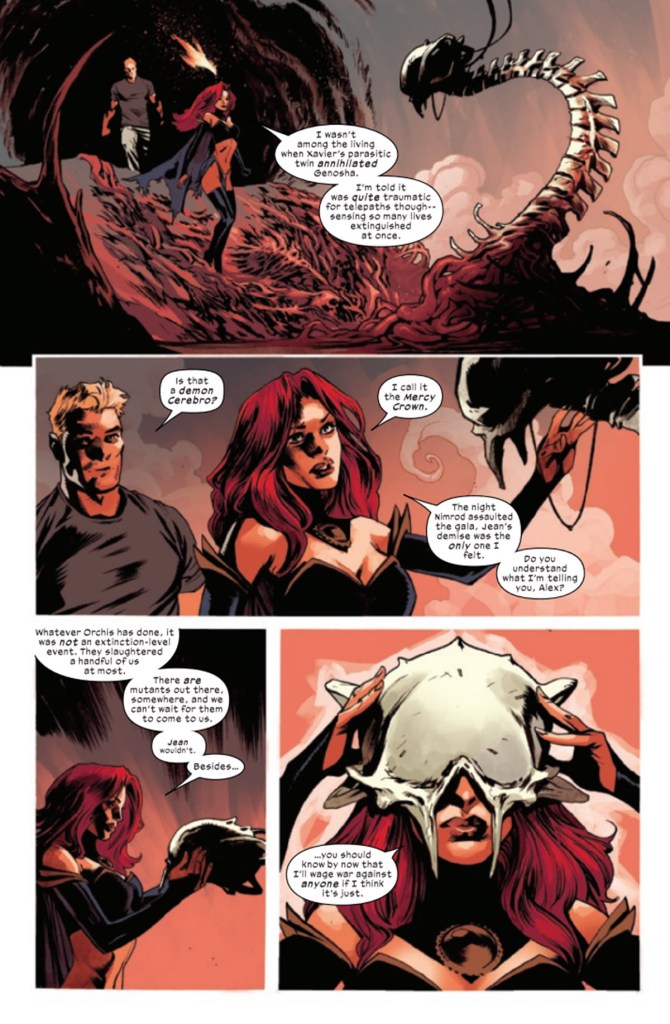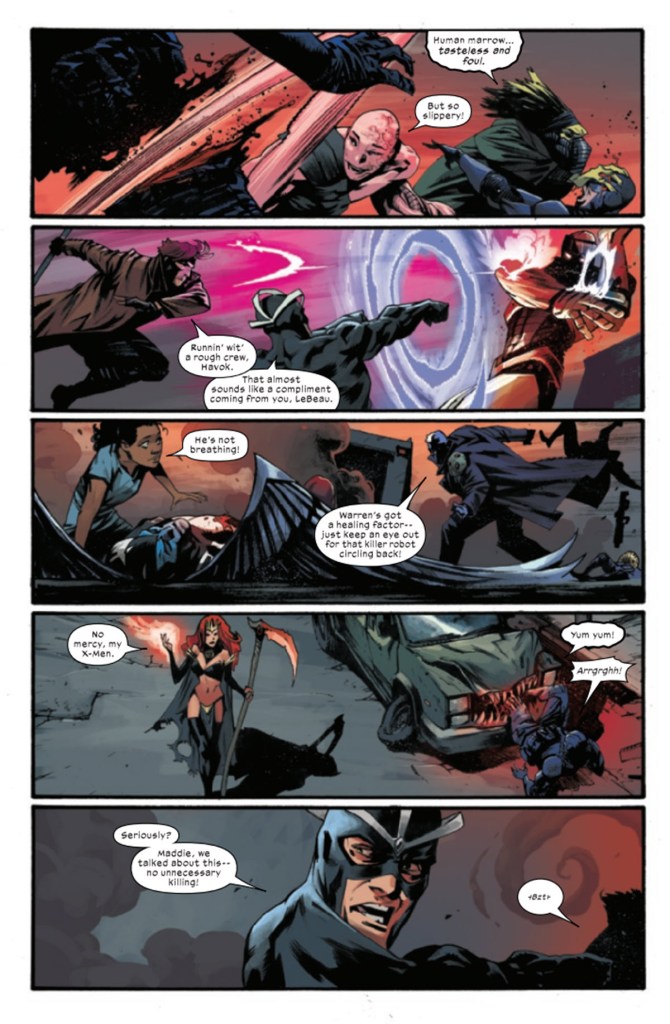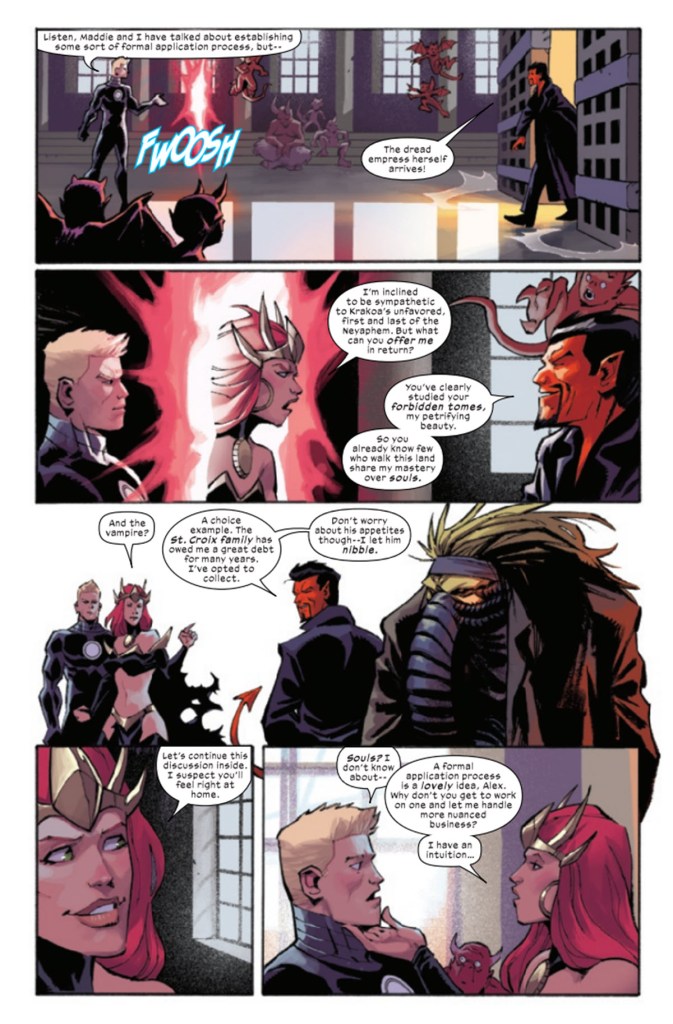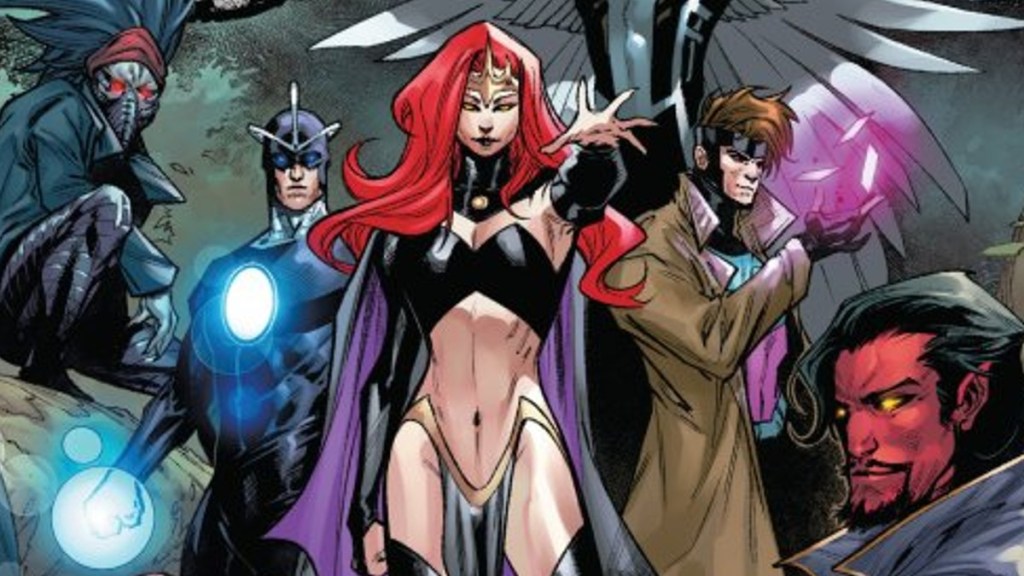With copious amounts of blood and demons, the first issue of Dark X-Men lives up to its name. Whether that’s a good thing or not will depend on how much you enjoyed Marvel Comics‘ edgy output during the 1990s.
A New Edge on a Classic Team
Things are looking bad for Mutantkind following the anti-Mutant group Orchis’ assault on the Hellfire Gala. Beyond killing multiple X-Men, including Jean Grey, Orchis also eliminated all the human witnesses of the event and successfully framed mutants for the massacre. In order to save his people, Professor X took control of every mutant he could and forced them to travel through the closest gates to the Mutant homeland of Krakoa.
Unfortunately, this has left all the mutants he couldn’t move vulnerable.
An unlikely sanctuary arose in the form of Limbo, which was recently granted an embassy in New York City. Naturally, Mutants seeking protection from a realm of demons has only served the narrative of Orchis. Despite this, current Queen of Limbo and clone of Jean Grey, the Goblin Queen Madelyn Pryor, is determined to protect those under her care by any means necessary. This leads her to form her own team of X-Men from the ranks of “the monsters, the misfits and freaks.”

The Dark X-Men Outlined
Dark X-Men #1 contains two stories. The first, “There Is A Kingdom,” details the current situation in Limbo and introduces all the members of the ensemble. This leads to two different teams trying to rescue the same captive mutant teenager. One team is made of the Goblin Queen, her boyfriend Havok, the teleporter Azazel, the power absorbing Emplate, and the body-sculpting Zero. The other team is made of Archangel, Gambit and Maggott. The two teams quickly agree to join forces to escape, but not everyone makes it out.
Steve Foxe’s script for this story is standard fare for an ensemble X-Men book. Foxe is big on showing the characters thoughts through their actions, rather than telling us what they are thinking. For instance, it is implied, but never outright stated, that Madelyn Pryor’s motivation in forming the Dark X-Men is to prove she is just as good as Jean Grey.

There isn’t a lot of space devoted to introducing the characters’ personalities or powers, outside of a title page giving the characters’ names. Presumably, Marvel believes everyone reading X-Men comics these days is already familiar with all characters involved. While that is probably true, it is still a bit odd for a first issue to be so blasé about introducing the cast.
The artwork by Jonas Scarg and Frank Martin is decent, but overly muddy at times. Scrag’s story flow is fantastic, but his inks are overly heavy in the medium and far shots. These obscure the fine pencils. Frank Martin’s colors are fantastic throughout, however.
A Week in the Life of Havok
The second story, “Do You Love Me,” is more comedic in tone. Set one week after the foundation of the Limbo Embassy, the story finds Havok trying to manage various crises in Madelyn’s absence. Hilarity ensues as he starts interviewing petitioners for asylum and sorting out legal issues with She-Hulk. This is all while trying to get some alone-time with Madelyn as she fends off a demonic rebellion.

I think it might have benefited Dark X-Men #1 to have “Do You Love Me” come first. Beyond the fact that it takes place first chronologically, it also does a better job of introducing Madelyn’s team. Steve Foxe also seems to be a far stronger writer when he allows for humor, rather than pushing straight action.
The artwork for this story, provided by Nelson Daniel, is also stronger. Daniel has a tremendous gift for expressions and conveying emotions through body language. Again, Frank Martin’s colors are amazing, as are the letters of Clayton Cowles.
In the end, Dark X-Men #1 is likely to appeal to fans of the darker X-Men comics of the 1990s. The detailed, visceral artwork is a throwback to that era, and the main story is as light on characterization as it is heavy on bloodshed. Thankfully, it’s not all doom and gloom — though it sets the stage for some dark days ahead.
Rating: 7/10
Dark X-Men #1 is now available in comic shops everywhere.










